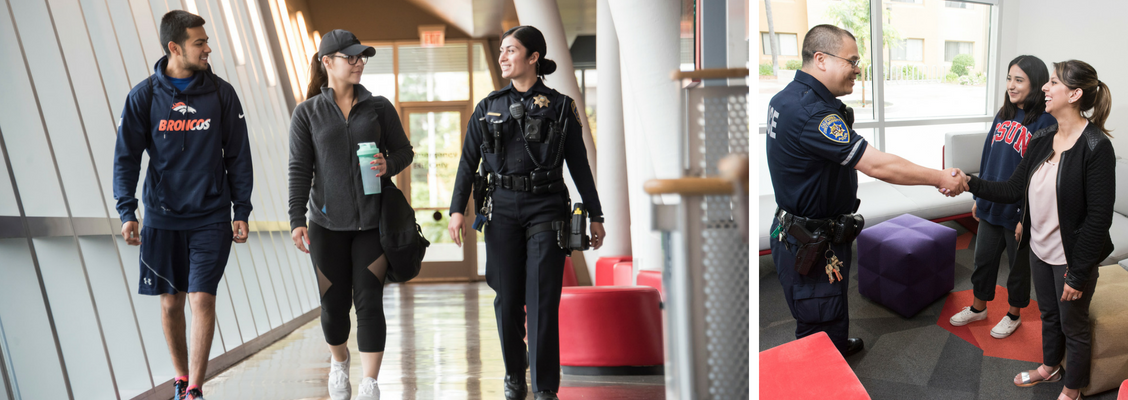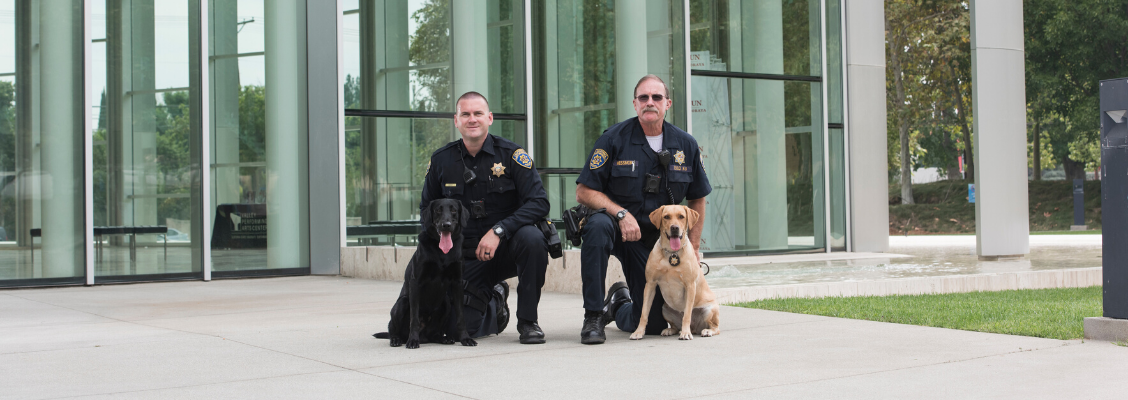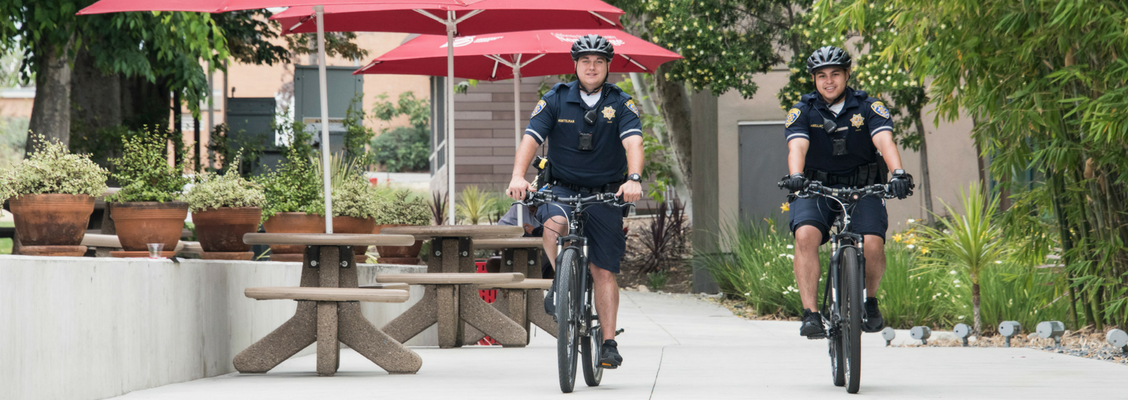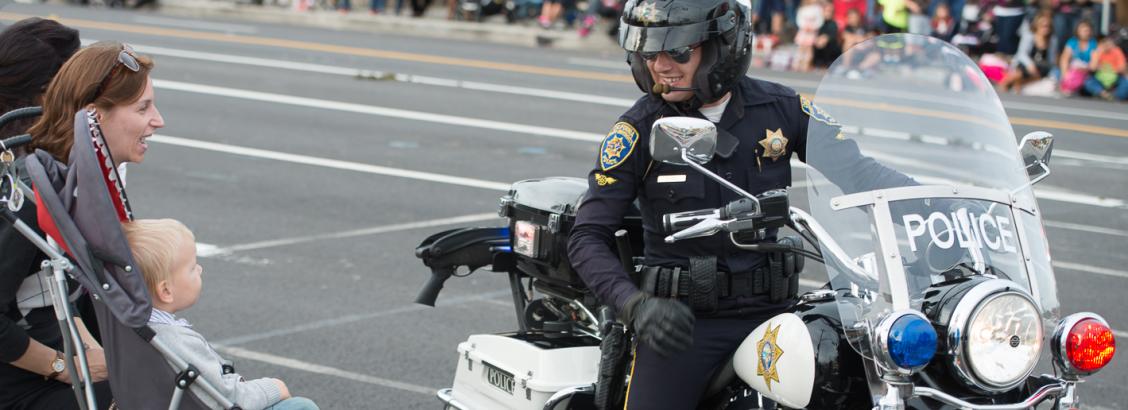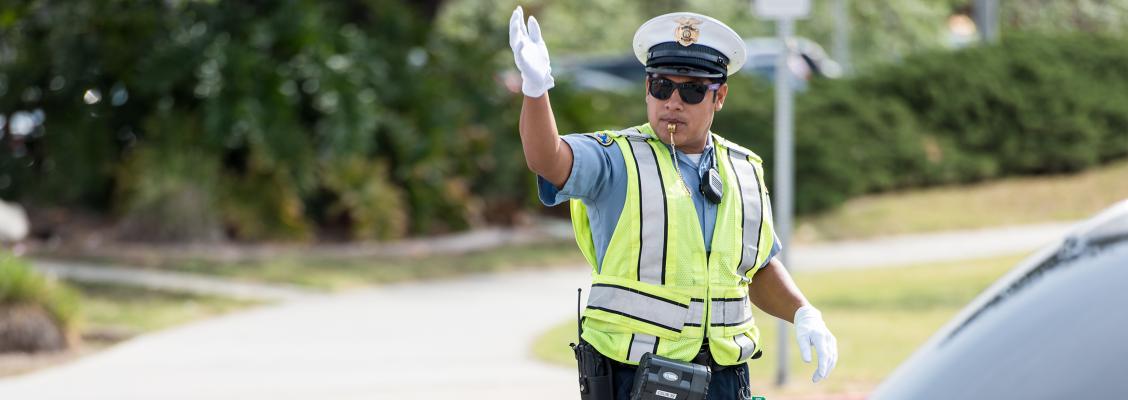Children may be only a small percentage of our population, but they are one hundred percent of our future. Make time to talk to YOUR CHILDREN about child safety.From free car seat inspections to the radKIDS personal empowerment and safety education program, CSUN Police Services offers several programs and services designed to keep the children in our community safe.
Child Safety Seats and Seat Belts
The Basics
Child Safety Seats and Seat Belts
The Basics
At Home
Preventing Sexual Abuse
Cyber Safety
Child Identification & Fingerprinting
What to do if Your Child is Missing
Safety Tips for Halloween & the Holidays
Additional Resources
Preventing Sexual Abuse
Cyber Safety
Child Identification & Fingerprinting
What to do if Your Child is Missing
Safety Tips for Halloween & the Holidays
Additional Resources
THE BASICS
- Make sure children know their full name, home address (and city), and full telephone number with the area code too.
- Be sure children know how to call 911 (from your cell phone and pay phones-remember, they’re free!).
- Teach children never to accept rides or gifts from someone they don’t know.
- Teach children to go to a store clerk, security guard or police officer for help if lost in a mall, store or on the street.
- Children should always be accompanied to public restrooms (malls, parks and playgrounds).
- If your child is a victim of any crime, from stolen lunch money to sexual abuse don’t blame him or her. Listen and offer sympathy. Then take action and report the incident to the necessary authorities and/or your child's school administration.
- Learn what to do if your child is missing.
AT HOME
- Children should carry their house keys on them in a concealed place, not left hidden outside the house.
- Teach your children to use the door and window locks and alarm system, if there is one.
- Children should know to never open the door or allow anyone into the home without parent’s permission.
- Children should never let a caller at the door or on the telephone know that they are home alone.
- Children should be taught how to escape a house in case of fire.
- Children should be taught not to go into an empty house or apartment if things don’t look right-a broken window, ripped screen or open door, for example.
- Parents should take time to talk to children about the deadly consequences of guns, medicines, power tools, drugs, alcohol, cleaning products and inhalants. Guns, medicines, power tools and cleaning products should be in a secure place out of sight and locked up.
- When home alone, older children should be able to easily locate key telephone numbers:
- Parent’s work number(s)
- Number of relatives or trusted neighbors
- Police and fire department
- Poison Control Center
PREVENTING SEXUAL ABUSE – TIPS FOR PARENTS
- Talk to your child(ren) every day and take time to really listen and observe. Learn as many details as you can about your child’s activities and feelings. Encourage him or her to share concerns and problems with you.
- Let your child know that he or she can tell you anything, and that you will be supportive.
- Teach children that no one, not even someone they know, has the right to touch them in a way that makes them feel uncomfortable. Tell them they have the right to say “NO” and to tell a trusted adult. If your child discloses that they have been touched, comfort them and reassure them that it's not their fault.
- Don’t force kids to kiss or hug or sit on a grown-ups lap if they don’t want to. This gives them control and teaches them that they have the right to refuse and say no if it makes them feel uncomfortable.
- Always know where your child is and who he or she is with.
- Tell your child to stay away from strangers who hang around playgrounds, public restrooms and schools.
- Be alert for changes in your child’s behavior that could signal sexual abuse such as sudden secretiveness, withdrawal from activities, refusal to go to school, unexpected hostility toward a favorite baby-sitter or relative or increased anxiety. Some physical signs of abuse include bed-wetting, loss of appetite, venereal disease, nightmares, and complaints of pain or irritation around the genitals.
- If your child is a victim of any crime, from stolen lunch money to sexual abuse don’t blame him or her. Listen and offer sympathy. Then take action and report the incident to the necessary authorities and/or your child's school administration.
CYBER-SAFETY FOR CHILDREN
The Internet has opened up a world of information for children. It also exposes them to risks. Children can be the target of a crime and exploitation as they use online internet services. Below are some recommendations for parents:
- Teach your children not to give out identifying information such as their name (first or last), parent’s name(s), home address, telephone numbers and school name if they meet people online. Knowing whom your children communicate with on the computer is key.
- Know the internet services your child uses. Learn how to block out objectionable material.
- Never permit a child to arrange a face-to-face meeting with someone they meet over the internet without parental permission. If such a meeting is arranged, make sure you accompany your child in a public location.
- Teach children not to respond to messages in chat rooms or bulletin board items that are suggestive, obscene or threatening. They should be encouraged to tell their parents if they encounter such messages.
- Children should not be allowed to send pictures of themselves to anyone without a parent’s permission.
- If parents become aware of the transmission, use or viewing of child pornography on the internet, they should immediately report it to the National Center for Missing and Exploited Children (1-800-843-5678) and your online service provider.
- It is recommended that the computer with internet access be kept in a family room or public place where everyone can access it; rather than a child’s bedroom.
- Children should have rules and guidelines for their computer use. Compliance with these rules should be monitored by a parent. Children should not be allowed to have excessive use of online services, especially at night.
- Children should never be allowed to enter an area on the internet that charges for services without permission of a parent.
- Parents should make sure that access to the internet at their children’s schools is monitored by adults.
- If a child’s friend has internet access at home, be sure to talk to the parents about the rules you have established for internet use.
For more information on cyber safety see our list of resources below.
(Information provided in part by, American Crime Prevention Institute, Law Enforcement Officer’s Crime Prevention Manual, 2001)
CHILD IDENTIFICATION & FINGERPRINTING
The assistance of local law enforcement and the media during the search for a missing child can be tremendous. As a parent/guardian it it is your responsibility to aid in the search by providing up-to-date descriptive information on your child to aid in the recovery. For more helpful information visit the National Center for Missing & Exploited Children's web site, Child Identification: What Parents/Guardians Should Know
Many national, state and local organizations have sponsored fingerprinting programs for children. The purpose of the fingerprinting program is to provide a means of identifying a child. Law enforcement agencies, including the California State University, Northridge Police Department, offer child fingerprinting kits at no cost. For more information on children's fingerprinting contact the Crime Prevention Unit: (818) 677-4997 and visit the National Child Identification Program.
Personal, at-home kits and child abduction resource information is also available courtesy of the Polly Klass Foundation. Order your FREE child safety kit today by visiting the Polly Klass Foundation.
Halloween Safety Tips
ADDITIONAL RESOURCES
Child Abuse, Protecting our Children is a Fundamental Responsibility (Brochure)
Children's Assault Treatment Services (Brochure)
FBI, Crimes Against Children
Family Watchdog - Sex Offender information and Alerts
iKeepSafe - Internet Safety Coalition
Missing Children Hotline: 1-800-222-FIND (1-800-222-3463)
National Center for Missing and Exploited Children (1-800-843-5678)
Child Identification: What Parents/Guardians Should Know
Netsmartz - Internet safety
National Sex Offender Registry
Not One More Child - A partnership between radKIDS & The Joyful Child Foundation
Protecting Our Kids, Keeping Children Safe on the Internet (Brochure)
radKIDS - Children's Personal Safety Empowerment Program
Seat Belts & Child Safety Seats
4 Steps to Child Safety Seats
The National Association to Protect Children
The Joyful Child Foundation - In Loving Memory of Samantha Reunion
The Department of Justice's Project Safe Childhood
The Polly Klass Foundation - In Loving Memory of Polly Klass
Wireless Amber Alerts - Get Amber Alerts to your Mobile Phone
For additional information on our programs and services for children, contact the Crime Prevention Unit at:
(818) 677-7922 or (818) 677-5820


